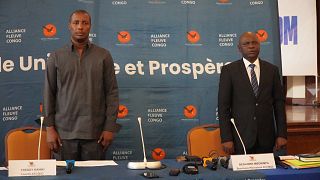Democratic Republic Of Congo
Volunteers in eastern Democratic Republic of Congo sing and dance trying to bring not just food but some happiness, to the thousands of children displaced by the violence and living in precarious conditions in the improvised camps for displaced persons in Nyiragongo region.
Members of the collective Goma Actif, which draws together artists, musicians, businessmen and other Goma residents to help those in need, prepare porridge to distribute among the families fleeing from the fight between the Army and the M23 rebel group.
"We come every morning to give porridge and bread to between 2-thousand and 5-thousand children depending on the day," said Patrick Mundeke, a volunteer member of the Goma Actif collective, after cooking a meal at Kayembe where one of the camps is located.
The humanitarian consequences of the resumption of clashes between the Congolese Army (FARDC) and the M23 in Rutshuru Territory have concerned the UN, who in a statement on Thursday said that 188,000 people had been displaced since the fighting resumed on October 20.
The new displacements, the UN said, bring the number of displaced people to at least 237,000 since March when the first clashes broke out. About 60 percent of the displaced are children (less than 18 years old). More than 76,000 children have had their schooling interrupted.
"In less than a week, we have already- UNICEF with its partners- have already identified more than 190 children who were separated from their families but more than half of them have been reunited," said Dounia Dekhili, UNICEF chief of Emergencies for DRC's eastern region.
Most of the displaced fleeing from the conflict in the last weeks, left their homes suddenly, with families running in different directions with nothing other than the clothes they were wearing.
"We heard bullets, after that everyone fled in their own direction, we had no opportunity to return to our homes and we came here without anything," explained Stephanie Merida, who arrived in Kayembe where she built a precarious tent with some plastics, to have a place to sleep.
About 54 percent of the displaced are living with host families, while thousands more are occupying schools, hospitals, churches and other makeshift sites.
"It's really a race against time because we find ourselves overnight with needs that triple, that multiply by five," Dekhili said.
She said the precarious camp conditions were a health risk - with the possibility of a cholera outbreak- as well as the risk of exposing the displaced to another kind of violence, "the conditions of proximity (living too close one to the other) also concern us, about the risk of exposure of children and women to gender-based violence."
Approximately 2,000 children are benefiting from a psychosocial program and awareness sessions are being organized to mitigate risks of gender-based violence, sexual abuse and exploitation, while care for victims is being set up, the UN said.
Some of the families have been fleeing to different places during the last eight months, since the conflict started, being displaced several times from one town to the other.
The situation in North Kivu is in addition to an already very complex and deteriorating humanitarian situation suffered by several regions, mainly in the East.
Ituri and North Kivu provinces are home to 64 percent of the country's 5.7 million IDPs.
"You see many NGOs here but these children are in famine, these children do not have food and when they bring donations, they are incompatible with the customs and eating habits of our displaced people," said Mundeke, adding that people were aware and helping the displaced families but that sometimes the aid did not arrive on the ground.
"While humanitarian assistance is paramount to saving lives," according to a statement by Bruno Lemarquis, the UN Humanitarian Coordinator in the DRC, "it is not the only solution to humanitarian problems, which will come from restoring security and peace."













01:01
Trial of DRC's former Justice Minister Constant Mutamba postponed for two weeks
01:12
One child displaced every five seconds in MENA region conflicts
00:08
Vatican beatifies Congolese customs worker killed in 2007 for refusing bribe
02:24
Celebration and protests: Nigeria marks 26 years of uninterrupted democracy
01:49
UN warns of impact Sudan's humanitarian crisis is having on Chad
01:24
DRC and Liberia elected to serve 2-year term on UN Security Council